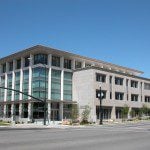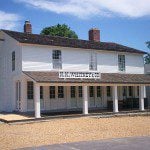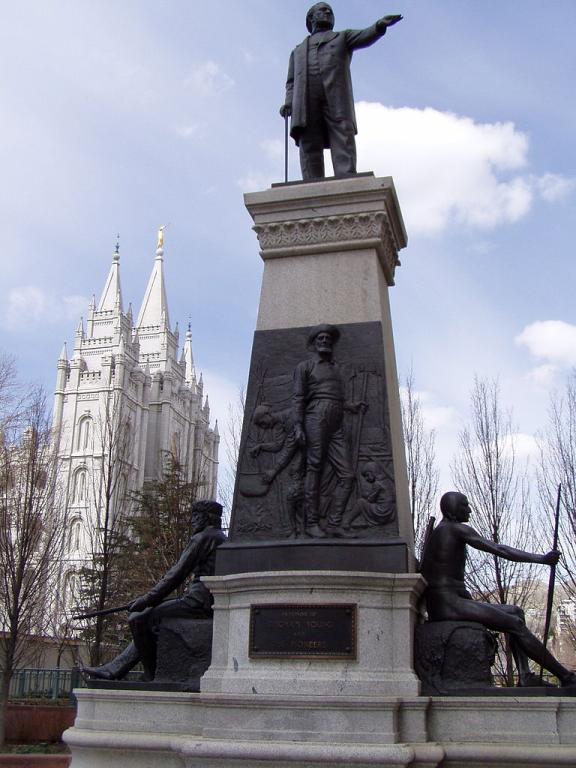
(Wikimedia Commons public domain)
Dipping briefly back into Eugene England, Brother Brigham (Salt Lake City: Bookcraft, 1980):
In February 1849, when the Saints were still relatively new in the Valley of the Great Salt Lake, President Brigham Young learned that some of them were going hungry while others seemed to be hoarding private supplies of grain. According to John D. Lee — not yet the infamous John D. Lee of the massacre at Mountain Meadows — Brigham’s reaction was verbally fierce:
Pres. B. Young said that we are safe; still he said . . . he believed all the while that corn was not so scarce as many expected, . . . and if those that have do not sell to those that have not, we will just take it and distribute amoung the poor, and those that have and will not divide willingly may be thankful that their heads are not found wallowing in the snow. There is some of the meanest spirits here amoung the saints that ever graced this footstool. They are too mean to live amoung the gentiles. . . . Still . . . I will talk to the people in public. I know the strongest side are willing to do right. (146-147, citing A Mormon Chronicle: The Diaries of John D. Lee, 1848-1876, eds. Robert G. Cleland and Juanita Brooks, 2 vols. [San Marino: The Huntington Library, 1955], 1.7)
Professor England expressly notes what he terms those “picturesque threats about heads wallowing in the snow.” But those words aren’t the whole story. “Characteristically,” England comments,
President Young had vented his feelings in extreme terms in the council meeting but then spoke and acted moderately — and every effectively — with the body of Saints. (147)
A similar incident had already occurred back on 6 January 1849, just a month before, when Brother Brigham had received a report that “those that have fat cattle were grinding the faces of the poor” by charging them extortionate prices. Some on the council proposed price controls, but Brigham said No. Instead, he proposed that members of the council organize prayer meetings and use their influence to reason with the people. And that is what he himself did. John D. Lee records,
Pres. B.Y. addressed the Saints in Public. Spoke of their conditions and of the opression of the poor; said to those that [have] corn to spare, to let it go on reasonable terms; said to those that had to bye, not to be particuelar about what they had to pay, for it would be salvation to them but death to the seller that extortioned. (147)
Commenting on the episode, Professor England writes that
The speech was effective and “greatly ameliorated the condition of the Poor.” Lee reports that “every man that could be touched was stirred by way of remembrance and began to let corn go,” and he give a convincing example. That Sunday morning a William Matthews had charged him forty dollars for an ox, but then:
The same day said Matthews went to meeting, heard what Pres. B. Young had to say about extortioners, came home the same evening and said to [me], kill the ox that I let you have and weigh it and pay me what he weighs. I likely asked you more than what he was worth, etc. Thus [Lee editorializes] the reader may see the effect of the preaching of the man of God. (147)
Here are some indications of Brigham Young’s honest self-estimation, expressed in his own words:
President Young knew well enough what his own chief fault was: in a speech in 1853 he told the Saint: “Never, in the days of my life, have I hurt a man with the palm of my hand. I never have hurt a person any other way except with this unruly member, my tongue.” (141)
“[It] is not the good, rel[i]gious, Sa[n]ctified feelings that I have that will present me or any other man blameless and acceptable before the Lord, but it is the good that we do to one another. . . . Esteem it a prevelege to help one another that you may have your reward. . . . I confess my own faults. I am subject to temptation and as liable to do wrong as any other man. . . . I know what is right all the time. I am never at a loss to know what is right, but sometimes I do not think or I am not guarded against the Temper.” (144)
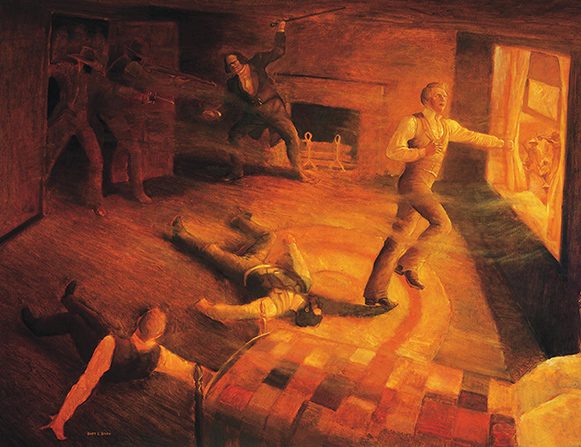
On another theme:
Brother Brigham was . . . perfectly clear about the relation of the Twelve to the Prophet:
The Twelve may get a revelation in any part of the world concerning the building up of the Kingdom, as they have to establish it in all parts of the world . . . but not to lead the Church — that belongs to the head of the Church.
And again, late in that same year, 1843, on another occasion when Joseph’s absence seems to have left Brigham automatically in charge:
I attended prayer-meeting in the Assembly Room. President Joseph Smith being absent, I presided and instructed the brethren upon the necessity of following our file leader, and our Savior, in all his laws and commandments, without asking any questions why they were so. (68-69)
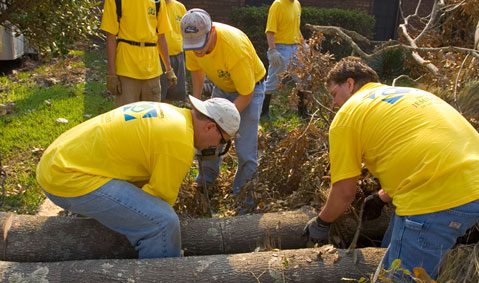
(Wikimedia Commons public domain image)
I close with four bone-chilling pieces from the Christopher Hitchens Memorial “How Religion Poisons Everything” File©:
“Church Partners with Women of Faith to Help Survivors of December 2022 Floods in Kinshasa”
And don’t miss this striking 8.5-minute video: “Christlike Service to Refugees”





